Leviticus 17 meaning explained in AI Summary
Centralized Worship at the Tabernacle
- Prohibition of Local Altars: This chapter establishes a key principle: all sacrifices must be offered at the central altar located at the tabernacle. This aimed to centralize worship and prevent the development of unauthorized or idolatrous practices.
- Importance of Blood Symbolism: The chapter emphasizes the significance of blood in the sacrificial system. Blood was seen as the life force, and its offering symbolized the transfer of sin or the dedication of life to God.
- Dietary Restriction on Blood Consumption: Building on the concept of blood's importance, the chapter forbids the consumption of blood by the Israelites. This may have been linked to the belief that blood carried the essence of life and belonged to God.
This chapter focuses on the sanctity of blood and the centralization of worship for the Israelites.
1. Restrictions on Animal Slaughter (1-9):
- All sacrifices must be offered at the tabernacle: Whether for food or burnt offerings, any animal from the herd or flock must be slaughtered at the entrance of the tabernacle. This reinforces the idea that God alone is worthy of sacrifice and that worship should be centralized.
- No sacrifices to "goat demons": The Israelites are warned against offering sacrifices to "goat demons," likely referring to pagan deities or practices. This highlights the importance of worshipping Yahweh exclusively.
- Consequences of disobedience: Those who disregard this command and sacrifice elsewhere will be "cut off" from their people, a phrase signifying spiritual separation and divine punishment.
2. Blood is Sacred (10-16):
- Prohibition against consuming blood: The Israelites are strictly forbidden from eating or drinking blood in any form. This is because "the life of a creature is in the blood," and blood is sacred to God.
- Atonement through blood: The text reiterates that blood is the means of atonement for sin. This foreshadows the ultimate sacrifice of Jesus Christ, whose blood would atone for the sins of humanity.
- Application to foreigners: The prohibition against consuming blood applies not only to native-born Israelites but also to foreigners residing among them. This emphasizes the universal nature of this law and its connection to God's holiness.
Overall, Leviticus 17 emphasizes:
- The importance of proper worship: All sacrifices must be offered to Yahweh alone and at the designated place, the tabernacle.
- The sanctity of blood: Blood represents life and is sacred to God. It is not to be consumed but used for atonement.
- God's holiness and his desire for a set-apart people: These laws highlight God's holiness and his desire for the Israelites to be distinct from the surrounding nations through their obedience and worship.
Leviticus 17 bible study ai commentary
Leviticus 17 is a pivotal chapter, acting as a bridge between the laws of sacrifice (1-16) and the laws of daily holiness (18-26). It establishes the absolute sanctity of blood and centralizes all worship and slaughter at the Tabernacle. By forbidding private sacrifices and the consumption of blood, the chapter directly confronts pagan religious practices and lays the foundational theological principle that life, represented by blood, belongs to God alone and is given by Him as the exclusive means of atonement.
Leviticus 17 context
The Israelites are at Mount Sinai, having received the laws for the Tabernacle and the sacrificial system. This chapter moves from the ideal system of worship to practical regulations for all people in the camp. Historically, worship in the Ancient Near East was decentralized, with numerous local shrines, high places, and family altars. It was common for pagan cults to worship "field-demons" and to practice ritual blood drinking to gain life force or commune with their gods. Leviticus 17 confronts this worldview by asserting Yahweh's exclusive claim over all life (blood) and all worship, unifying Israel's religious life around a single, holy sanctuary.
Leviticus 17:1-7
And the LORD spoke to Moses, saying, “Speak to Aaron and his sons and to all the people of Israel and say to them, This is the thing that the LORD has commanded. If any one of the house of Israel kills an ox or a lamb or a goat in the camp, or kills it outside the camp, and does not bring it to the entrance of the tent of meeting to offer it as a gift to the LORD before the tabernacle of the LORD, bloodguilt shall be imputed to that man. He has shed blood, and that man shall be cut off from among his people. This is to the end that the people of Israel may bring their sacrifices that they sacrifice in the open field, that they may bring them to the LORD, to the priest at the entrance of the tent of meeting, and sacrifice them as sacrifices of peace offerings to the LORD. And the priest shall throw the blood on the altar of the LORD at the entrance of the tent of meeting and burn the fat for a pleasing aroma to the LORD. So they shall no more sacrifice their sacrifices to goat demons, after whom they whore. This shall be a statute forever for them throughout their generations.
In-depth-analysis
- Centralization of Worship: The command is absolute—any slaughter of a domestic animal (ox, lamb, goat) must be treated as a sacrifice brought to the Tabernacle. This prevents unsanctioned, private altars which could lead to syncretism or paganism.
- Bloodguilt (dām): Killing an animal outside this system is not just disobedient; it is equated with shedding human blood (dam) and treated as murder. This underscores that all life belongs to God, and taking it requires divine sanction.
- Cut off (kārat): The penalty for this "bloodguilt" is being "cut off from among his people," signifying excommunication or capital punishment, a complete removal from the covenant community.
- Open Field Sacrifices: Explicitly forbids the common Canaanite practice of worshipping on "high places" or in open fields, which were associated with nature deities and demons.
- Goat Demons (śĕ‘îrîm): The term literally means "hairy ones." This is a direct polemic against the worship of satyr-like field deities, nature spirits, or demons, which was considered spiritual adultery ("whoring"). This law roots out folk religion and demonic worship.
- The fat of the peace offering provides a "pleasing aroma," reminding Israel that even the portions of an animal for human consumption must first have its holiest parts surrendered to God.
Bible references
- Deuteronomy 12:13-15: 'Take care that you do not offer your burnt offerings in any place that you see, but in the place that the LORD will choose... you may slaughter and eat meat... just as when the gazelle or the deer is eaten.' (Later clarification allowing for non-sacrificial slaughter once settled in the land, far from the central sanctuary, but reiterating the principle of a single place of worship).
- 1 Kings 12:28-31: 'So the king took counsel and made two calves of gold... And he set up houses on high places and appointed priests from among all the people...' (Jeroboam's direct violation of this principle, leading to national apostasy).
- John 4:21-24: 'Jesus said to her, "Woman, believe me, the hour is coming when neither on this mountain nor in Jerusalem will you worship the Father... the true worshipers will worship the Father in spirit and truth."' (The fulfillment of the "central place" principle, transitioning it from a physical location to the person of Christ and the nature of worship).
- 2 Chronicles 11:15: '[Jeroboam] appointed his own priests for the high places and for the goat demons and for the calves that he had made.' (Explicit historical link showing this prohibition was against a real practice).
Cross references
Deut 12:2-6 (Destroy pagan altars), Lev 3:2 (Peace offering blood on altar), Gen 35:2 (Put away foreign gods), 1 Cor 10:20 (Sacrifice to demons), Rev 17:5 (Spiritual harlotry).
Leviticus 17:8-9
And you shall say to them, Any one of the house of Israel, or of the strangers who sojourn among them, who offers a burnt offering or sacrifice and does not bring it to the entrance of the tent of meeting to offer it to the LORD, that man shall be cut off from his people.
In-depth-analysis
- Inclusivity of the Law: This verse explicitly extends the law of centralized worship to the "strangers who sojourn among them" (gēr).
- This establishes one standard of worship and holiness for everyone living within the covenant community. Participation in the life of Israel meant adherence to its core theological commitments, preventing the establishment of foreign cults within the camp.
- The same severe penalty ("cut off") applies, demonstrating the non-negotiable nature of monotheistic worship.
Bible references
- Exodus 12:49: 'There shall be one law for the native and for the stranger who sojourns among you.' (Establishes the principle of a single law for all in the community).
- Numbers 15:29: 'You shall have one law for him who does anything unintentionally, for him who is native among the people of Israel and for the stranger who sojourns among them.' (Reinforces the single legal standard for both natives and sojourners).
- Ephesians 2:19: 'So then you are no longer strangers and aliens, but you are fellow citizens with the saints and members of the household of God.' (NT fulfillment where Gentiles are fully integrated into the people of God).
Cross references
Lev 19:34 (Love the sojourner), Isa 56:3-7 (Foreigners joining Israel), Rom 3:29 (Is God the God of Jews only?).
Leviticus 17:10-12
“If any one of the house of Israel or of the strangers who sojourn among them eats any blood, I will set my face against that person who eats blood and will cut him off from among his people. For the life of the flesh is in the blood, and I have given it for you on the altar to make atonement for your souls, for it is the blood that makes atonement by the life. Therefore I have said to the people of Israel, No person among you shall eat blood, neither shall any stranger who sojourns among you eat blood.
In-depth-analysis
- Theological Core: This is the theological apex of the chapter and the entire sacrificial system.
- God's Personal Opposition: "I will set my face against" is a powerful idiom indicating direct, personal, divine judgment.
- Life in the Blood (nephesh baddām): This is the foundational reason. "Life" here is nephesh, meaning soul, living being, or life-force. Blood is not mere fluid; it is the tangible carrier of life itself.
- Blood for Atonement (kipper): God's exclusive claim on blood is because He has designated it for a single, sacred purpose: to "make atonement" (kipper, to cover/ransom) for the nephesh (soul) of the sinner.
- Vicarious Atonement: The principle is clear: "it is the blood that makes atonement by the life (nephesh)." The life (nephesh) of an innocent substitute is given to cover the life (nephesh) of a guilty person. Consuming blood is therefore robbing God of His ordained means of redemption and profaning the very symbol of life.
- Again, the law applies equally to the Israelite and the sojourner, establishing this as a universal principle within God's domain.
Bible references
- Genesis 9:4: 'But you shall not eat flesh with its life, that is, its blood.' (This prohibition predates the Mosaic Law, given to Noah and all humanity, indicating its universal, creation-based importance).
- Hebrews 9:22: 'Indeed, under the law almost everything is purified with blood, and without the shedding of blood there is no forgiveness of sins.' (The definitive NT commentary on the principle of Leviticus 17).
- Matthew 26:28: '...for this is my blood of the covenant, which is poured out for many for the forgiveness of sins.' (Jesus directly applies the language of blood for atonement to his own death, fulfilling the Levitical shadow).
- Acts 15:28-29: '...that you abstain from what has been sacrificed to idols, and from blood, and from what has been strangled...' (The Jerusalem Council requires Gentile converts to abstain from blood, upholding the universal Noahic principle, not as a means of salvation but as a key ethical boundary separating them from pagan practices).
Cross references
1 Sam 14:33 (People sinned by eating with the blood), Ezek 33:25 (Condemnation for eating blood), 1 Pet 1:18-19 (Ransomed with the precious blood of Christ), Rev 1:5 (Freed by His blood).
Leviticus 17:13-14
“Any one also of the people of Israel, or of the strangers who sojourn among them, who takes in a hunt a beast or a bird that may be eaten shall pour out its blood and cover it with earth. For the life of all flesh is its blood. Its blood is its life. Therefore I have said to the people of Israel, You shall not eat the blood of any flesh, for the life of all flesh is its blood. Whoever eats it shall be cut off.”
In-depth-analysis
- Extension to Hunting: The principle now moves from the sacred context of the Tabernacle to the secular context of hunting.
- Covering the Blood: Draining the blood is not enough; it must be covered with earth. This is an act of reverence, returning the life force symbolically to the ground from which life comes (Gen 2:7). It prevents the profaning of life and acknowledges that the blood belongs to God, even when the animal is not for the altar.
- Repetition for Emphasis: The verse emphatically repeats the core axiom: "the life of all flesh is its blood" to drive the point home. The principle is inviolable, regardless of the context of the animal's death.
Bible references
- Deuteronomy 12:23-24: 'Only be sure that you do not eat the blood, for the blood is the life... You shall not eat it; you shall pour it out on the earth like water.' (Parallels and reinforces the law for when Israel is settled in the land).
- Ezekiel 24:7: 'For the blood she shed is in her midst; she set it on the bare rock; she did not pour it out on the ground to cover it with dust.' (Prophetic condemnation using the imagery of uncovered blood as a sign of unatoned-for guilt crying out for justice).
Cross references
Gen 4:10 (Abel's blood crying out from ground), Deut 15:23 (Pouring blood out), Ezek 39:12-15 (Covering the dead).
Leviticus 17:15-16
“And every person who eats what dies of itself or what is torn by beasts, whether he is a native or a sojourner, shall wash his clothes and bathe himself in water and be unclean until the evening; then he shall be clean. But if he does not wash them or bathe his flesh, he shall bear his iniquity.”
In-depth-analysis
- Practical Concession: This addresses eating meat from animals not properly slaughtered—those that died naturally (nebelah) or were killed by predators (terephah).
- Ritual Uncleanness: While not a capital offense like intentionally eating blood, consuming such meat still results in ritual uncleanness. The blood was not properly drained, and the animal's death was outside the sanctioned order.
- Process of Purification: The remedy is not sacrifice, but ritual washing ("wash his clothes and bathe") and waiting until evening. This is a standard procedure for lesser defilements.
- Bearing Iniquity: Failure to undergo this simple purification ritual is a serious offense. "He shall bear his iniquity" implies being held liable and facing divine consequences for contempt of God's commands regarding holiness. It elevates ritual cleanliness from a mere suggestion to a covenant obligation.
Bible references
- Leviticus 11:39-40: 'And if any animal of which you may eat dies, whoever touches its carcass shall be unclean until the evening, and whoever eats of its carcass shall wash his clothes...' (The parallel law in the context of clean and unclean animals).
- Deuteronomy 14:21: 'You shall not eat anything that has died of itself. You may give it to the sojourner who is within your towns, that he may eat it, or you may sell it to a foreigner.' (This seemingly contradictory verse is understood by scholars in a few ways: 1) It applies to a different type of sojourner—a temporary traveler, not a gēr seeking to be part of the community, or 2) It highlights the difference between moral law (blood) and ceremonial purity, which was less binding on non-covenant members).
- Acts 10:14-15: 'But Peter said, “By no means, Lord; for I have never eaten anything that is common or unclean.” And the voice came to him again a second time, “What God has made clean, do not call common.”' (Shows the nullification of the ritual distinction for the New Covenant era, though the moral principles behind it persist).
Cross references
Lev 22:8 (Prohibition for priests), Exod 22:31 (Cannot eat torn flesh), Ezek 4:14 (Ezekiel's purity).
Leviticus chapter 17 analysis
- Chiastic Structure: The chapter is structured as a chiasm, focusing attention on the central verses:
- A. vv. 3–7 Prohibition of slaughter away from the sanctuary
- B. vv. 8–9 Obligation to bring all sacrifices to the sanctuary
- C. vv. 10–12 Prohibition of eating blood because blood is for atonement
- B’. vv. 13–14 Obligation to drain blood from hunted animals
- A’. vv. 15–16 Uncleanness from eating animals not properly slaughtered
- The Bridge Chapter: Leviticus 17 flawlessly connects the priestly regulations of chapters 1-16 to the practical, lay-person holiness of chapters 18-26. It takes the central doctrine of the altar—atonement through blood—and applies it to the entire nation's daily life, including diet and interactions with non-Israelites.
- The "Sojourner" (Gēr): The fourfold repetition of including the gēr (sojourner) in these laws is significant. It demonstrates that the core principles of monotheism (one God, one altar) and the sanctity of life (blood is for atonement) are not ethnic customs but divine truths applicable to all who dwell within God's covenant community.
- Blood: from Pollution to Redemption: In the ancient world, shed blood often signified pollution and vengeance (Gen 4:10). Here, God transforms blood's meaning. While still potent and forbidden for human use, He consecrates it as the exclusive agent of purification and atonement on the altar.
Leviticus 17 summary
This chapter commands that all slaughter and sacrifice be centralized at the Tabernacle to prevent pagan worship of "goat-demons." It strictly forbids consuming blood for any person in the community, Israelite or sojourner, establishing the foundational principle that life (nephesh) is in the blood, and God has given blood exclusively for making atonement on the altar.
Leviticus 17 AI Image Audio and Video

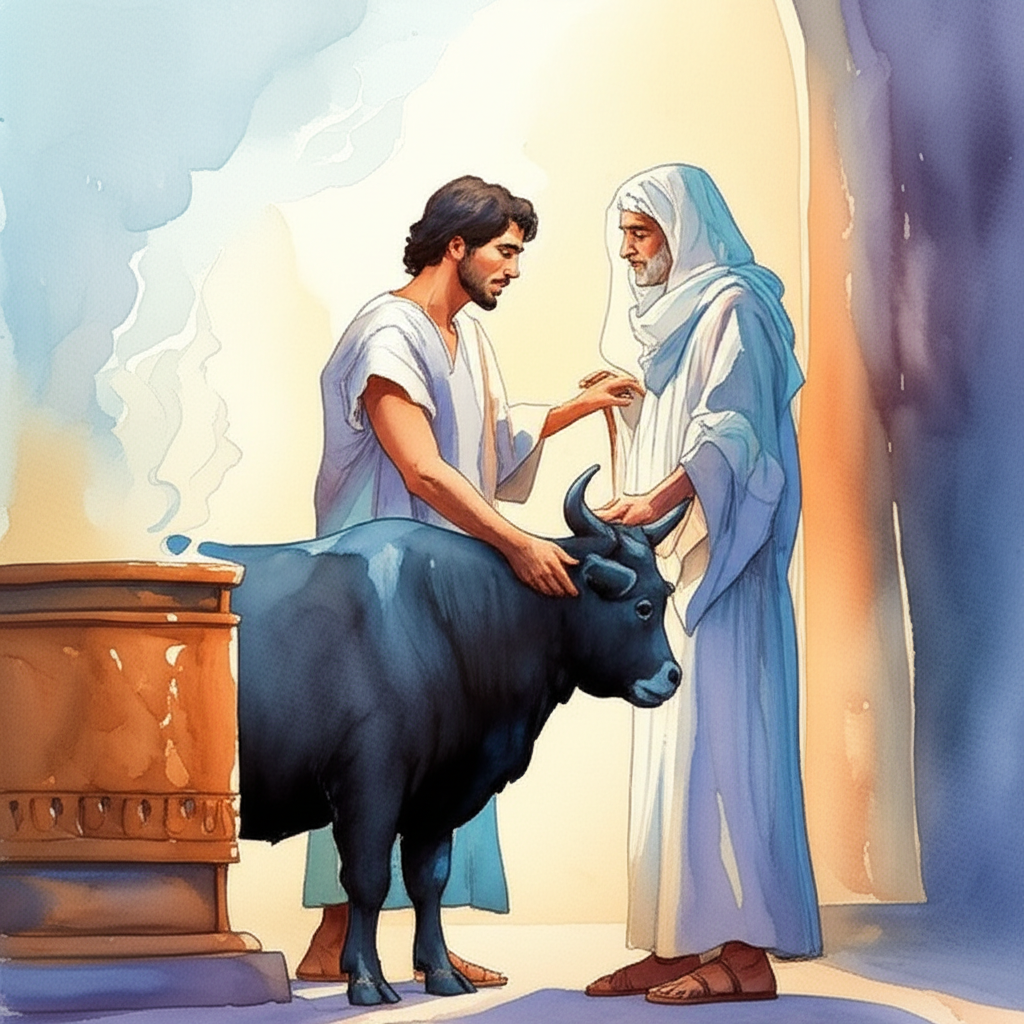
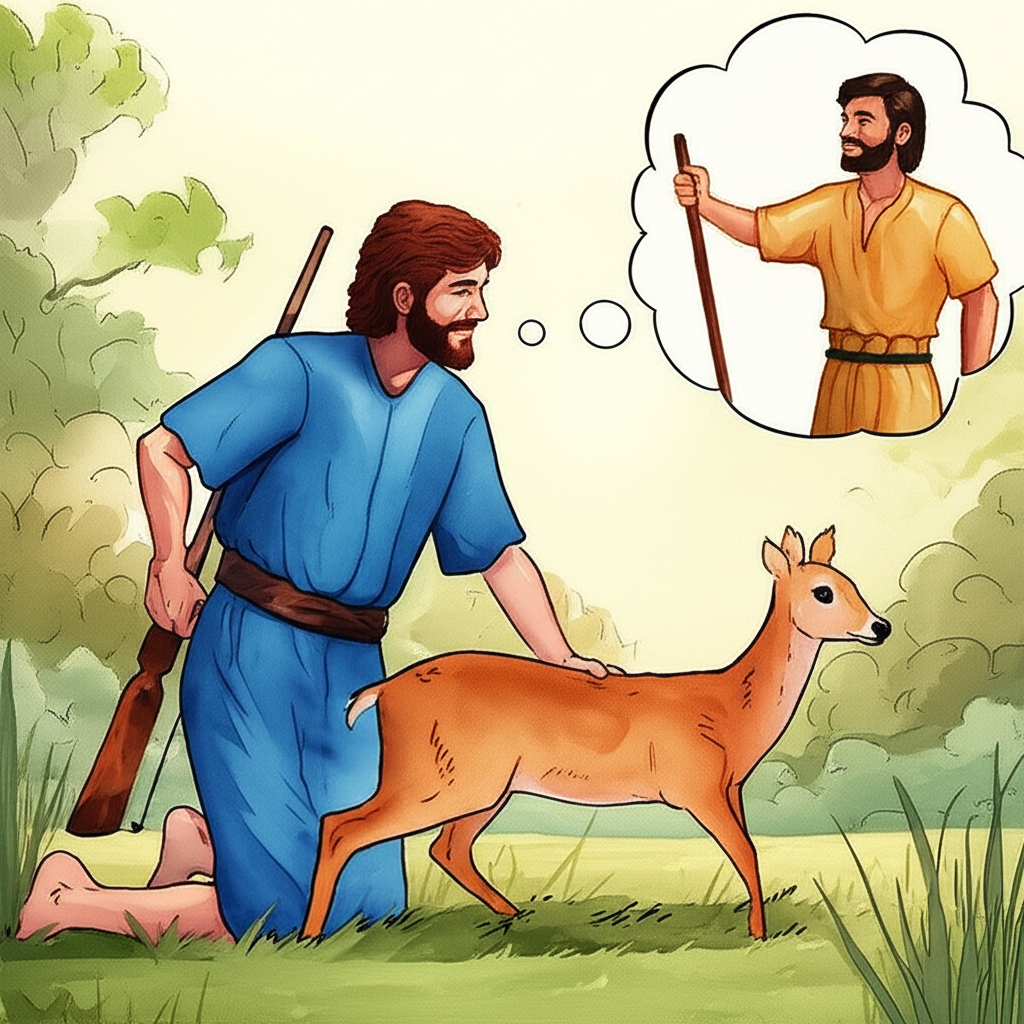

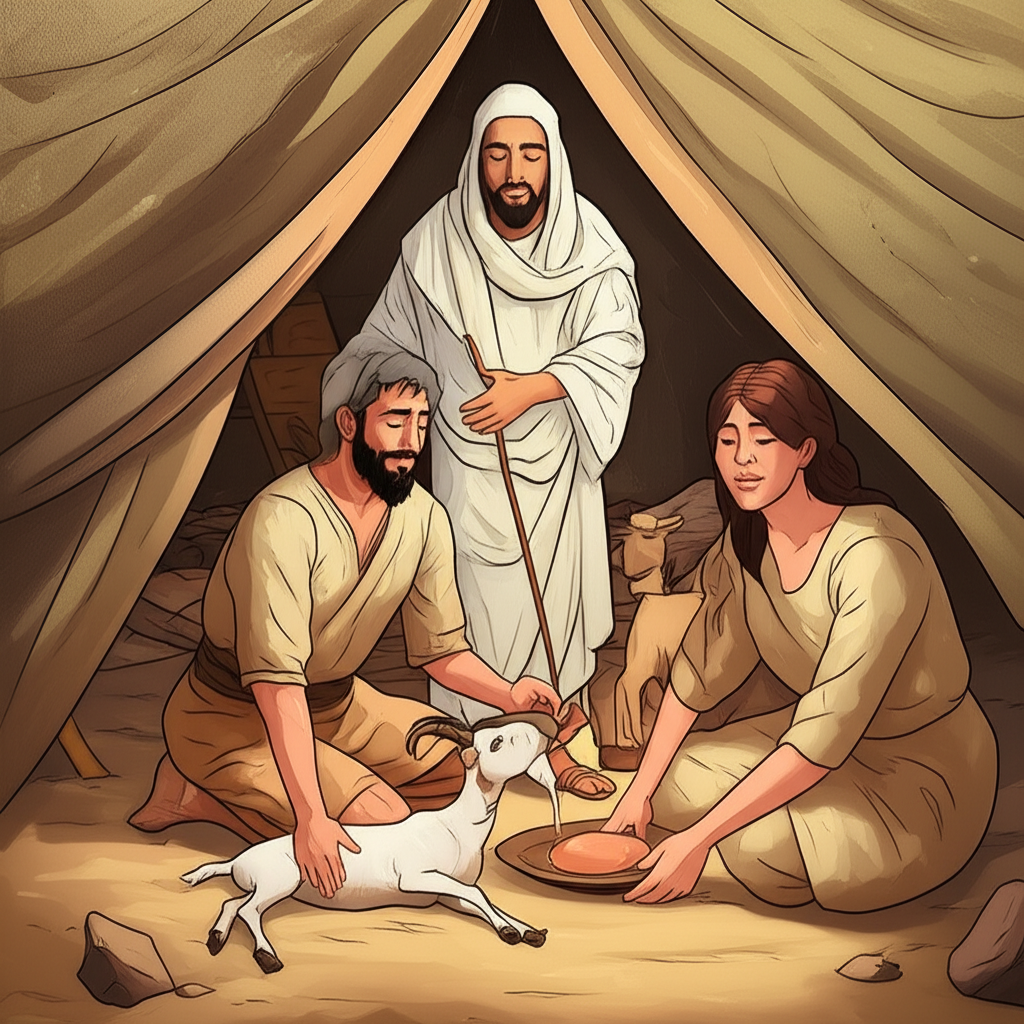
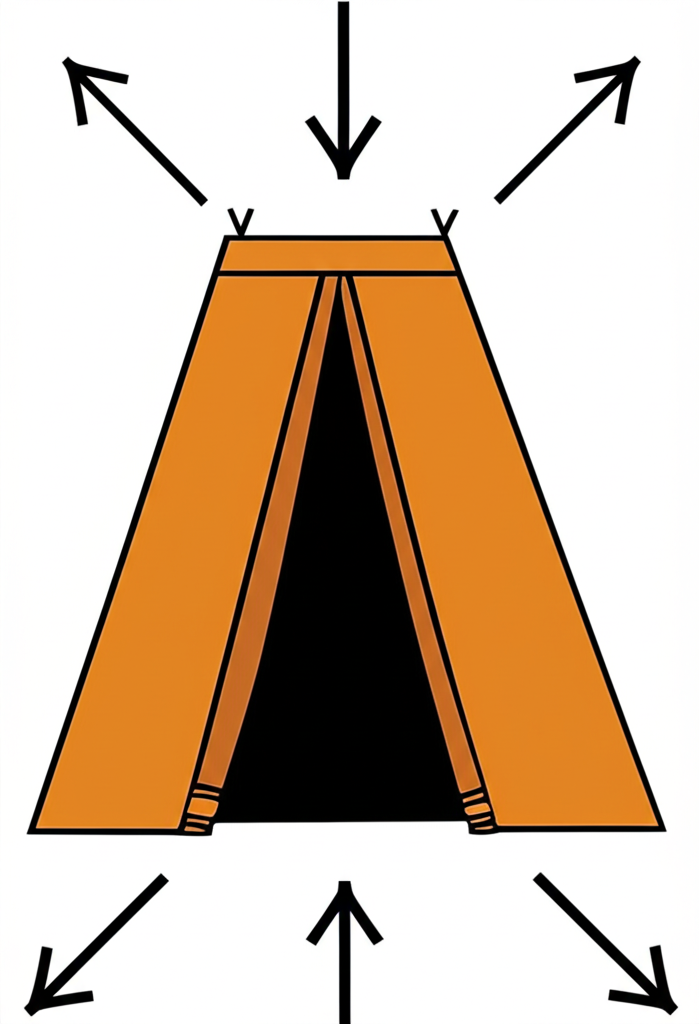
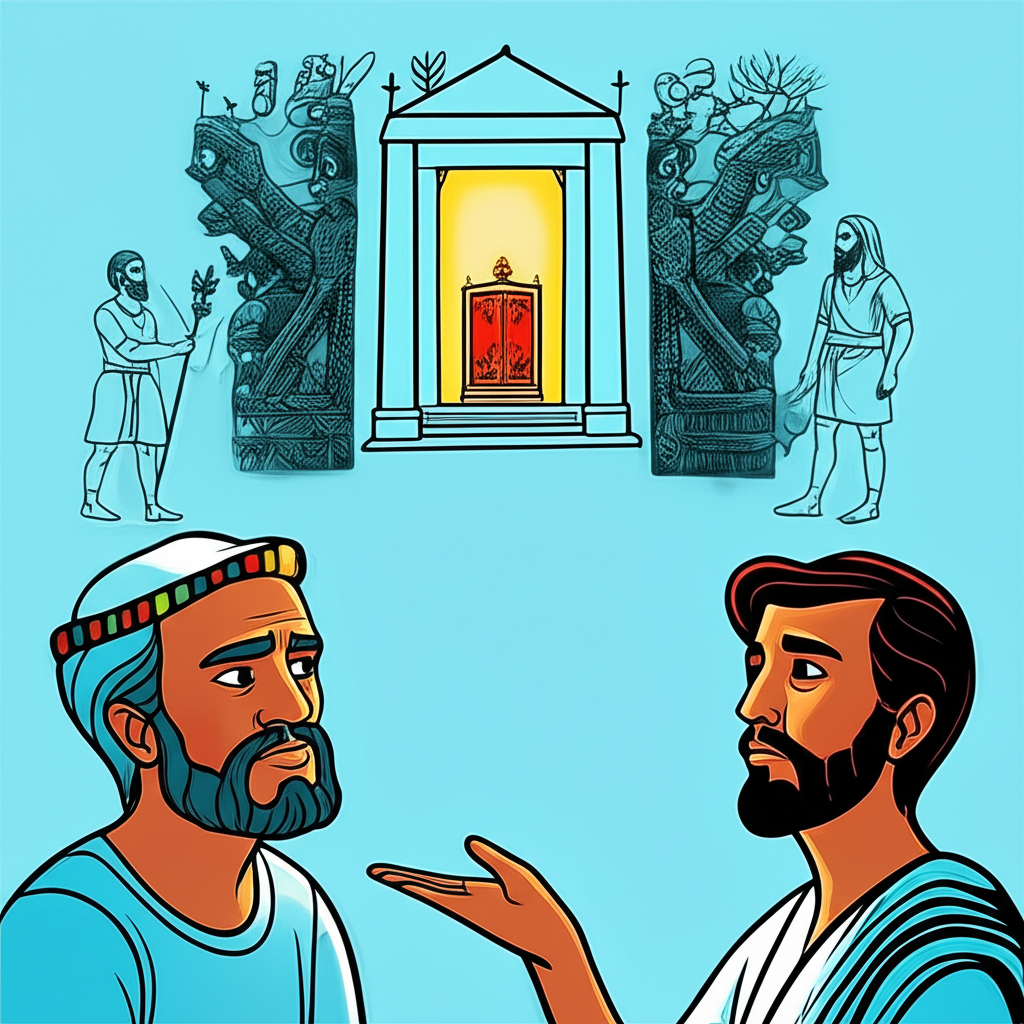



Leviticus chapter 17 kjv
- 1 And the LORD spake unto Moses, saying,
- 2 Speak unto Aaron, and unto his sons, and unto all the children of Israel, and say unto them; This is the thing which the LORD hath commanded, saying,
- 3 What man soever there be of the house of Israel, that killeth an ox, or lamb, or goat, in the camp, or that killeth it out of the camp,
- 4 And bringeth it not unto the door of the tabernacle of the congregation, to offer an offering unto the LORD before the tabernacle of the LORD; blood shall be imputed unto that man; he hath shed blood; and that man shall be cut off from among his people:
- 5 To the end that the children of Israel may bring their sacrifices, which they offer in the open field, even that they may bring them unto the LORD, unto the door of the tabernacle of the congregation, unto the priest, and offer them for peace offerings unto the LORD.
- 6 And the priest shall sprinkle the blood upon the altar of the LORD at the door of the tabernacle of the congregation, and burn the fat for a sweet savor unto the LORD.
- 7 And they shall no more offer their sacrifices unto devils, after whom they have gone a whoring. This shall be a statute for ever unto them throughout their generations.
- 8 And thou shalt say unto them, Whatsoever man there be of the house of Israel, or of the strangers which sojourn among you, that offereth a burnt offering or sacrifice,
- 9 And bringeth it not unto the door of the tabernacle of the congregation, to offer it unto the LORD; even that man shall be cut off from among his people.
- 10 And whatsoever man there be of the house of Israel, or of the strangers that sojourn among you, that eateth any manner of blood; I will even set my face against that soul that eateth blood, and will cut him off from among his people.
- 11 For the life of the flesh is in the blood: and I have given it to you upon the altar to make an atonement for your souls: for it is the blood that maketh an atonement for the soul.
- 12 Therefore I said unto the children of Israel, No soul of you shall eat blood, neither shall any stranger that sojourneth among you eat blood.
- 13 And whatsoever man there be of the children of Israel, or of the strangers that sojourn among you, which hunteth and catcheth any beast or fowl that may be eaten; he shall even pour out the blood thereof, and cover it with dust.
- 14 For it is the life of all flesh; the blood of it is for the life thereof: therefore I said unto the children of Israel, Ye shall eat the blood of no manner of flesh: for the life of all flesh is the blood thereof: whosoever eateth it shall be cut off.
- 15 And every soul that eateth that which died of itself, or that which was torn with beasts, whether it be one of your own country, or a stranger, he shall both wash his clothes, and bathe himself in water, and be unclean until the even: then shall he be clean.
- 16 But if he wash them not, nor bathe his flesh; then he shall bear his iniquity.
Leviticus chapter 17 nkjv
- 1 And the LORD spoke to Moses, saying,
- 2 "Speak to Aaron, to his sons, and to all the children of Israel, and say to them, 'This is the thing which the LORD has commanded, saying:
- 3 "Whatever man of the house of Israel who kills an ox or lamb or goat in the camp, or who kills it outside the camp,
- 4 and does not bring it to the door of the tabernacle of meeting to offer an offering to the LORD before the tabernacle of the LORD, the guilt of bloodshed shall be imputed to that man. He has shed blood; and that man shall be cut off from among his people,
- 5 to the end that the children of Israel may bring their sacrifices which they offer in the open field, that they may bring them to the LORD at the door of the tabernacle of meeting, to the priest, and offer them as peace offerings to the LORD.
- 6 And the priest shall sprinkle the blood on the altar of the LORD at the door of the tabernacle of meeting, and burn the fat for a sweet aroma to the LORD.
- 7 They shall no more offer their sacrifices to demons, after whom they have played the harlot. This shall be a statute forever for them throughout their generations." '
- 8 "Also you shall say to them: 'Whatever man of the house of Israel, or of the strangers who dwell among you, who offers a burnt offering or sacrifice,
- 9 and does not bring it to the door of the tabernacle of meeting, to offer it to the LORD, that man shall be cut off from among his people.
- 10 'And whatever man of the house of Israel, or of the strangers who dwell among you, who eats any blood, I will set My face against that person who eats blood, and will cut him off from among his people.
- 11 For the life of the flesh is in the blood, and I have given it to you upon the altar to make atonement for your souls; for it is the blood that makes atonement for the soul.'
- 12 Therefore I said to the children of Israel, 'No one among you shall eat blood, nor shall any stranger who dwells among you eat blood.'
- 13 "Whatever man of the children of Israel, or of the strangers who dwell among you, who hunts and catches any animal or bird that may be eaten, he shall pour out its blood and cover it with dust;
- 14 for it is the life of all flesh. Its blood sustains its life. Therefore I said to the children of Israel, 'You shall not eat the blood of any flesh, for the life of all flesh is its blood. Whoever eats it shall be cut off.'
- 15 "And every person who eats what died naturally or what was torn by beasts, whether he is a native of your own country or a stranger, he shall both wash his clothes and bathe in water, and be unclean until evening. Then he shall be clean.
- 16 But if he does not wash them or bathe his body, then he shall bear his guilt."
Leviticus chapter 17 niv
- 1 The LORD said to Moses,
- 2 "Speak to Aaron and his sons and to all the Israelites and say to them: 'This is what the LORD has commanded:
- 3 Any Israelite who sacrifices an ox, a lamb or a goat in the camp or outside of it
- 4 instead of bringing it to the entrance to the tent of meeting to present it as an offering to the LORD in front of the tabernacle of the LORD?that person shall be considered guilty of bloodshed; they have shed blood and must be cut off from their people.
- 5 This is so the Israelites will bring to the LORD the sacrifices they are now making in the open fields. They must bring them to the priest, that is, to the LORD, at the entrance to the tent of meeting and sacrifice them as fellowship offerings.
- 6 The priest is to splash the blood against the altar of the LORD at the entrance to the tent of meeting and burn the fat as an aroma pleasing to the LORD.
- 7 They must no longer offer any of their sacrifices to the goat idols to whom they prostitute themselves. This is to be a lasting ordinance for them and for the generations to come.'
- 8 "Say to them: 'Any Israelite or any foreigner residing among them who offers a burnt offering or sacrifice
- 9 and does not bring it to the entrance to the tent of meeting to sacrifice it to the LORD must be cut off from the people of Israel.
- 10 "?'I will set my face against any Israelite or any foreigner residing among them who eats blood, and I will cut them off from the people.
- 11 For the life of a creature is in the blood, and I have given it to you to make atonement for yourselves on the altar; it is the blood that makes atonement for one's life.
- 12 Therefore I say to the Israelites, "None of you may eat blood, nor may any foreigner residing among you eat blood."
- 13 "?'Any Israelite or any foreigner residing among you who hunts any animal or bird that may be eaten must drain out the blood and cover it with earth,
- 14 because the life of every creature is its blood. That is why I have said to the Israelites, "You must not eat the blood of any creature, because the life of every creature is its blood; anyone who eats it must be cut off."
- 15 "?'Anyone, whether native-born or foreigner, who eats anything found dead or torn by wild animals must wash their clothes and bathe with water, and they will be ceremonially unclean till evening; then they will be clean.
- 16 But if they do not wash their clothes and bathe themselves, they will be held responsible.'?"
Leviticus chapter 17 esv
- 1 And the LORD spoke to Moses, saying,
- 2 "Speak to Aaron and his sons and to all the people of Israel and say to them, This is the thing that the LORD has commanded.
- 3 If any one of the house of Israel kills an ox or a lamb or a goat in the camp, or kills it outside the camp,
- 4 and does not bring it to the entrance of the tent of meeting to offer it as a gift to the LORD in front of the tabernacle of the LORD, bloodguilt shall be imputed to that man. He has shed blood, and that man shall be cut off from among his people.
- 5 This is to the end that the people of Israel may bring their sacrifices that they sacrifice in the open field, that they may bring them to the LORD, to the priest at the entrance of the tent of meeting, and sacrifice them as sacrifices of peace offerings to the LORD.
- 6 And the priest shall throw the blood on the altar of the LORD at the entrance of the tent of meeting and burn the fat for a pleasing aroma to the LORD.
- 7 So they shall no more sacrifice their sacrifices to goat demons, after whom they whore. This shall be a statute forever for them throughout their generations.
- 8 "And you shall say to them, Any one of the house of Israel, or of the strangers who sojourn among them, who offers a burnt offering or sacrifice
- 9 and does not bring it to the entrance of the tent of meeting to offer it to the LORD, that man shall be cut off from his people.
- 10 "If any one of the house of Israel or of the strangers who sojourn among them eats any blood, I will set my face against that person who eats blood and will cut him off from among his people.
- 11 For the life of the flesh is in the blood, and I have given it for you on the altar to make atonement for your souls, for it is the blood that makes atonement by the life.
- 12 Therefore I have said to the people of Israel, No person among you shall eat blood, neither shall any stranger who sojourns among you eat blood.
- 13 "Any one also of the people of Israel, or of the strangers who sojourn among them, who takes in hunting any beast or bird that may be eaten shall pour out its blood and cover it with earth.
- 14 For the life of every creature is its blood: its blood is its life. Therefore I have said to the people of Israel, You shall not eat the blood of any creature, for the life of every creature is its blood. Whoever eats it shall be cut off.
- 15 And every person who eats what dies of itself or what is torn by beasts, whether he is a native or a sojourner, shall wash his clothes and bathe himself in water and be unclean until the evening; then he shall be clean.
- 16 But if he does not wash them or bathe his flesh, he shall bear his iniquity."
Leviticus chapter 17 nlt
- 1 Then the LORD said to Moses,
- 2 "Give the following instructions to Aaron and his sons and all the people of Israel. This is what the LORD has commanded.
- 3 "If any native Israelite sacrifices a bull or a lamb or a goat anywhere inside or outside the camp
- 4 instead of bringing it to the entrance of the Tabernacle to present it as an offering to the LORD, that person will be as guilty as a murderer. Such a person has shed blood and will be cut off from the community.
- 5 The purpose of this rule is to stop the Israelites from sacrificing animals in the open fields. It will ensure that they bring their sacrifices to the priest at the entrance of the Tabernacle, so he can present them to the LORD as peace offerings.
- 6 Then the priest will be able to splatter the blood against the LORD's altar at the entrance of the Tabernacle, and he will burn the fat as a pleasing aroma to the LORD.
- 7 The people must no longer be unfaithful to the LORD by offering sacrifices to the goat idols. This is a permanent law for them, to be observed from generation to generation.
- 8 "Give them this command as well. If any native Israelite or foreigner living among you offers a burnt offering or a sacrifice
- 9 but does not bring it to the entrance of the Tabernacle to offer it to the LORD, that person will be cut off from the community.
- 10 "And if any native Israelite or foreigner living among you eats or drinks blood in any form, I will turn against that person and cut him off from the community of your people,
- 11 for the life of the body is in its blood. I have given you the blood on the altar to purify you, making you right with the LORD. It is the blood, given in exchange for a life, that makes purification possible.
- 12 That is why I have said to the people of Israel, 'You must never eat or drink blood ? neither you nor the foreigners living among you.'
- 13 "And if any native Israelite or foreigner living among you goes hunting and kills an animal or bird that is approved for eating, he must drain its blood and cover it with earth.
- 14 The life of every creature is in its blood. That is why I have said to the people of Israel, 'You must never eat or drink blood, for the life of any creature is in its blood.' So whoever consumes blood will be cut off from the community.
- 15 "And if any native-born Israelites or foreigners eat the meat of an animal that died naturally or was torn up by wild animals, they must wash their clothes and bathe themselves in water. They will remain ceremonially unclean until evening, but then they will be clean.
- 16 But if they do not wash their clothes and bathe themselves, they will be punished for their sin."
- Bible Book of Leviticus
- 1 Laws for Burnt Offerings
- 2 Laws for Grain Offerings
- 3 Laws for Peace Offerings
- 4 Sacrifies for Sin
- 5 Laws for Guilt Offerings
- 6 The Priests and the Offerings
- 7 Law of the trespass offering
- 8 Consecration of Aaron and His Sons
- 9 The Lord Accepts Aaron's Offering
- 10 The Death of Nadab and Abihu
- 11 Clean and unclean Animals
- 12 Purification After Childbirth
- 13 Laws About Leprosy
- 14 Laws for Cleansing Lepers
- 15 Sperm Discharge and Menstruation cycle
- 16 Day of Atonement
- 17 The Place of Sacrifice
- 18 Unlawful Sexual Relations
- 19 Levitical Laws for Levites
- 20 Punishment for Child Sacrifice
- 21 Holiness and the Priests
- 22 Acceptable Offerings
- 23 The Feasts of the Lord
- 24 The Lamps
- 25 Year of Jubilee
- 26 Blessings for Obedience
- 27 Laws About Vows